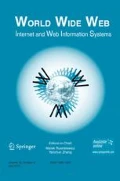Abstract
Multi-agent technologies have been widely employed for the development of web-based systems, including web-based e-markets, web-based grid computing, e-governments and service-oriented software systems. In these service-oriented systems, service provider agents and service consumer agents are autonomous and rational entities, which can enter and leave the environments freely. For simplicity, we use terms ‘provider’ and ‘consumer’ to represent this two types of agents. How to select the most suitable service providers according to a service request from a consumer in such an open environment is a very challenging issue. In this paper, we propose an innovative trust model, called the GTrust model, for service group selection in general service-oriented environments. In the GTrust model, the trust evaluation for a service group is based on the functionality coverage of the group, the dependency relationships among individual services in the group, the ratings of individual services on the attributes of the service request and a similarity measurement of the extent to which reference reports can reflect the service request in terms of the priority distribution of attributes. The experimental results and analysis demonstrate the good performance of the GTrust model on the service group selection in service-oriented environments.










Similar content being viewed by others
References
Commerce, B.E., Jøsang, A., Ismail, R.: The beta reputation system. In: Proceedings of the 15th Bled Electronic Commerce Conference (2002)
Deitel, H., Deitel, P., Nieto, T.: e-Business & e-Commerce How to Program. Prentice Hall (2001)
Fang, H., Zhang, J., Thalmann, N.M.: A trust model stemmed from the diffusion theory for opinion evaluation. In: AAMAS ’13, pp. 805–812. International Foundation for Autonomous Agents and Multiagent Systems, Richland (2013)
Foster, I., Kesselman, C., Tuecke, S.: The anatomy of the grid: Enabling scalable virtual organizations. Int. J. High Perform. Comput. Appl. 15(3), 200–222 (2001)
Heeks, R., Bailur, S.: Analyzing e-government research: Perspectives, philosophies, theories, methods, and practice. Gov. Inf. Q. 24(2), 243–265 (2007)
Hermoso, R., Billhardt, H., Ossowski, S.: Role evolution in open multi-agent systems as an information source for trust. In: Autonomous Agents & Multiagent Systems/Agent Theories, Architectures, and Languages, pp. 217–224 (2010)
Huynh, T., Jennings, N., Shadbolt, N.: Certified reputation: How an agent can trust a stranger. In: AAMAS’06, pp .1217–1224 (2006)
Huynh, T., Jennings, N., Shadbolt, N.: An integrated trust and reputation model for open multi-agent systems. J. Auton. Agent. Multi-Agent Syst. 13(2), 119–154 (2006)
Jiang, S., Zhang, J., Ong, Y.: An evolutionary model for constructing robust trust networks. In: AAMAS ’13, pp. 813–820. Richland (2013)
Liu, S., Yu, H., Miao, C., Kot, A.C.: A fuzzy logic based reputation model against unfair ratings. In: AAMAS ’13, pp. 821–828. Richland (2013)
Ren, F., Zhang, M., Sim, K.: Adaptive conceding strategies for automated trading agents in dynamic, open markets. Decis. Support. Syst. 48(2), 331–341 (2009)
Sabater, J., Sierra, C.: Regret: Reputation in gregarious societies. In: Proceedings of the fifth international conference on Autonomous agents, pp. 194–195 (2001)
Saha, D., Mukherjee, A.: Pervasive computing: A paradigm for the 21st century. IEEE Comput. 36(3), 25–31 (2003)
Sensoy, M., Yolum, P.: A context-aware approach for service selection using ontologies. In: AAMAS ’06 (2006)
Sharmin, M., Ahmed, S., Ahamed, S.: An adaptive lightweight trust reliant secure resource discovery for pervasive computing environments. In: PERCOM’06, pp. 258–263. IEEE Computer Society (2006)
Singh, M.P.: Trust as dependence: a logical approach. In: AAMAS ’11, pp. 863–870. Richland (2011)
Su, X., Zhang, M., Mu, Y., Bai, Q.: Gtrust: An innovated trust model for group services selection in web-based service-oriented environments. In: The 12th International Conference on Web Information System Engineering, pp. 306–313. Springer (2011)
Su, X., Zhang, M., Mu, Y., Bai, Q.: A robust trust model for service-oriented systems. Journal of Computer and System Sciences 79(5), 596–608 (2013)
Su, X., Zhang, M., Mu, Y., Sim, K.: Pbtrust: A priority-based trust model for service selection in general service-oriented environments. In: 2010 IEEE/IFIP 8th International Conference on Embedded and Ubiquitous Computing (EUC), pp 841–848 (2010)
Tang, J., Seuken, S., Parkes, D.C.: Hybrid transitive trust mechanisms. In: Autonomous Agents & Multiagent Systems/Agent Theories, Architectures, and Languages, pp. 233–240 (2010)
Teacy, W., Patel, J., Jennings, N., Luck, M.: Travos: Trust and reputation in the context of inaccurate information sources. J. Autofocus Agent Multiagent Syst. 12, 18396198 (2006)
Vogiatzis, G., MacGillivray, I., Chli, M.: A probabilistic model for trust and reputation. In: AAMAS’100, pp. 225–232. International Foundation for Autonomous Agents and Multiagent Systems, Richland (2010)
Wang, J., Sun, H.: A new evidential trust model for open communities. Comput. Stand. Interfaces 31, 994–1001 (2009)
Yildiz, M.: E-government research: Reviewing the literature, limitations, and ways forward. Gov. Inf. Q. 24(3), 646–665 (2007)
Yu, B., Singh, M.: An evidential model of distributed reputation management. In: AAMAS’02, pp. 294–301. ACM Press (2002)
Zacharia, G., Maes, P.: Trust management through reputation mechanisms. Appl. Artif. Intell. 14(9), 881–907 (2000)
Zhang, M., Tang, J., Fulcher, J.: Advanced Computational Intelligence Paradigms: Theory and Applications, Studies in Computational Intelligence (SCI). Agent Based Grid Computing, vol. 115, pp. 439–483. Springer-Verlag (2008)
Acknowledgments
Dr. Madeleine Cincotta is acknowledged for editing the final manuscript.
Author information
Authors and Affiliations
Corresponding author
Rights and permissions
About this article
Cite this article
Su, X., Zhang, M. & Mu, Y. Trust-based group services selection in web-based service-oriented environments. World Wide Web 19, 807–832 (2016). https://doi.org/10.1007/s11280-015-0362-0
Received:
Revised:
Accepted:
Published:
Issue Date:
DOI: https://doi.org/10.1007/s11280-015-0362-0



